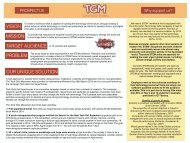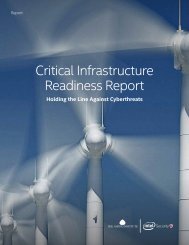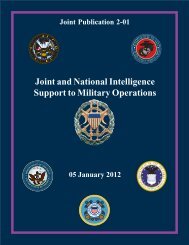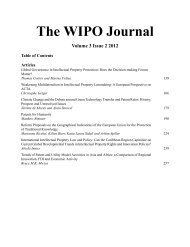Transparency Initiative (EITI)
2eoch1l
2eoch1l
Create successful ePaper yourself
Turn your PDF publications into a flip-book with our unique Google optimized e-Paper software.
16 Introduction<br />
FIGURE 1: VISUALIZING THE POTENTIAL OF RECOMMENDATIONS FROM <strong>EITI</strong> REPORTS ALONG THE VALUE CHAIN.<br />
Contracts<br />
and licenses<br />
Production<br />
Revenue<br />
collection<br />
Revenue<br />
allocation<br />
Social and<br />
economic<br />
spending<br />
framework:<br />
Ghana<br />
License allocations:<br />
Burkina Faso<br />
License registers:<br />
Peru<br />
Contracts:<br />
Mongolia<br />
ownership:<br />
Liberia<br />
State participation:<br />
Myanmar<br />
Exploration:<br />
Albania<br />
Production:<br />
Zambia<br />
Exports:<br />
Togo<br />
Taxes and<br />
other payments:<br />
Indonesia<br />
In-kind revenues:<br />
Trinidad and Tobago<br />
Transport<br />
revenues:<br />
Nigeria<br />
Barter<br />
arrangements:<br />
Democratic Republic<br />
of Congo<br />
Subnational<br />
payments:<br />
Senegal<br />
Financial<br />
transactions between<br />
the government and<br />
state-owned companies:<br />
Nigeria<br />
Auditing and<br />
assurance practices:<br />
Iraq<br />
Distribution of<br />
revenues:<br />
Chad<br />
Sub-national<br />
transfers: :<br />
Philippines<br />
Revenue<br />
management and<br />
expenditure:<br />
Ghana<br />
expenditures:<br />
:<br />
Nigeria<br />
Social payments:<br />
Cameroon<br />
Contribution to<br />
the economy:<br />
Afghanistan<br />
Source: <strong>EITI</strong> 2016: From reports to reform, p. 2; own adjustments.<br />
The transition is still ongoing, and not all countries have<br />
produced comprehensive reports under the 2013 Standard<br />
yet. The <strong>EITI</strong> Standard was further strengthened in 2016,<br />
including requirements on the disclosure of beneficial<br />
ownership, and giving greater recognition to countries that<br />
make transparency a routine feature of their sector governance<br />
(‘mainstreaming’).<br />
So far, 31 countries are <strong>EITI</strong> compliant based on the ‘slim’<br />
and not sufficiently impact oriented 2011 rules. There are<br />
just 34 countries that implement the <strong>EITI</strong> for more than<br />
five years. Five years can be considered as a sufficient timelag<br />
that allows results of the <strong>EITI</strong> to trickle down into datasets<br />
and makes subsequent macro-data analysis and evaluation<br />
of the <strong>EITI</strong> reasonable.









